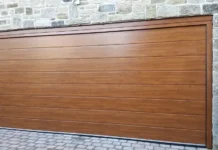If you’re wondering if you can sleep in a house after polyurethane, the answer is an obvious no. This article will cover aspects such as why sleeping in a house after polyurethane is not recommended, how long polyurethane takes to stop smelling, and how to make polyurethane stop smelling faster, among other things.
But first, let’s review what polyurethane is and how it’s used.
What is Polyurethane?
Polyurethane, which is most typically seen in the form of flexible foam, is one of the most prevalent materials used in homewares such as furniture, bedding, and carpet underlay. Polyurethane foam is a flexible cushioning substance that makes upholstered furniture more durable, pleasant, and supportive.
Polyurethane is a plastic that has been chemically altered to become a liquid in its most basic form. The material remains a liquid until it is placed on a surface and allowed to dry. It appears as a thin layer of plastic-like material on top of the surface to which it was applied.
Polyurethane comes in a number of different forms, including water and oil-based formulations. It comes in a number of finishes, including satin, matte and glossy. For wood flooring, water-based polyurethane is perhaps the most popular alternative. This is because it has low toxicity and has a moderate smell. This makes it easy to apply the product to your floors without causing too much disruption to your daily routine.
What is Polyurethane Used For?
Polyurethane can do a lot more than simply coat wood. According to scientists, it’s a chemical that can be employed in a variety of ways.
Clothing, for example, typically uses polyurethane. It may be spun into fine threads, helping designers to create stretchier, lighter clothes. Polyurethane is also used by building professionals. It is molded into materials with exceptional performance properties. It provides a high strength-to-weight ratio, excellent insulating properties, and the versatility and durability required by builders.
DIYers are most likely to apply polyurethane to their flooring. It can be used as a top-layer floor covering as well as a foam underlay. It works on a range of surfaces, including wood, parquet, and cement.
Polyurethane provides a long-lasting, simple-to-clean, and easy-to-maintain finish. Its properties can help a new floor last longer or restore the elegance of an old one. Polyurethane adds a glossy polish to timber floors while also protecting and prolonging their lives.
However, safety must be ensured during the application procedure as well as after it has dried.
Can You Sleep in House After Polyurethane?
Now coming back to the main question if we should sleep in the house after Polyurethane. Here is an explanation.
After applying the polyurethane, it’s best not to sleep in the house for at least two days. If at all possible, stay away for at least 5 to 7 days. This is to verify that the polyurethane-related fumes and aromas have dissipated before you sleep in your home.
Polyurethane fumes are dangerous, and they seem to hang around in the air for a long time after application and even after drying. These fumes should be avoided due to the risk of major negative effects. The most common side effects of these gasses are asthma and other respiratory problems.
The strong stench also makes it difficult to stay for lengthy amounts of time due to nausea and headaches. As a result, you should look for alternative lodging as soon as the polyurethane has been applied. Most of the fumes and odors should have gone away after two days, but to be safe, wait five to seven days before moving in.
How long does Polyurethane take to stop smelling?
You’ll notice a distinct chemical odor as soon as you apply polyurethane to your floor. This is a rather typical occurrence that should not be cause for concern. Polyurethane has a strong stench that might be uncomfortable to be around. You might be wondering how long you’ll have to put up with the strong odors of polyurethane.
There should be an odor persisting anywhere between five and seven days. Even after the job is done, polyurethane may still be smelled up to one month later.
Now that we know that it is not advisable to stay in the house but what happens if you breathe in polyurethane?
What happens if you breathe in polyurethane?
If by any chance you step into a house with recent use in polyurethane, this is what to expect out of it:
- Urethane can irritate the nose and throat when inhaled.
- Extremely high levels of exposure might result in headaches, nausea, vomiting, dizziness, lightheadedness, and even passing out. It’s possible that it’ll harm the brain and bone marrow.
How to get rid of the polyurethane smell fast?
The majority of people wish to get rid of the remaining polyurethane stench since they don’t want to smell it every time they breathe. It can be sped up by following a few well-planned measures.
Wash & Clean:
After the polyurethane has dried completely, remove all residual materials and tools from the house. It’s best to wash and clean them first, then transport them to the storage facility.
Open all the windows in your home:
Open all of the windows in the house. This improves air circulation, and the odor will be reduced as a result of the increased airflow and ventilation.
Install a Box Fan:
If possible, place a box fan in your open windows and leave it running throughout the entire day. As the air circulates, the fumes are carried out of the house with it.
Utilize an air purifier:
After completing the above measures, an air purifier can be used to completely eliminate any toxins from the air.
Ways to speed up drying time of polyurethane
- Apply a Thinner.
- Use Water-Based Polyurethane.
- Apply Some Heat.
- Lower the Humidity.
Should You Choose Water-Based or Oil-Based Polyurethane?
Polyurethane coatings come in two different types: water-based and oil-based. Each has its own set of benefits that DIYers value for different reasons.
Water-based polyurethane has a lesser odor than oil-based polyurethane and dries faster. It’s an excellent solution for surfaces that aren’t subjected to a lot of heat. However, compared to oil-based polyurethane, this product will probably require more coatings.
Oil-based polyurethane, on the other hand, takes longer to dry and emits a stronger stench. It is, however, more durable and develops an amber color with time, whereas water-based polyurethane does not. This product also outperforms the competitors in terms of heat resistance.
Water-based polyurethane is a better choice for DIYers because of its feature,as for the people who want to stay in their home while the coating dries. Oil-based polyurethane is preferred by DIYers who desire a more lasting finish, despite the fact that it smells worse and takes longer to dry.
Conclusion
I hope you’ve got cleared with your query can you sleep in house after polyurethane. Polyurethane is harmful to breathe in, so it is always advised to not sleep in the house after it but if there is any emergency then make sure to dry it out by using above mentioned steps.













